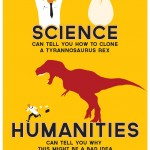The latest trend in cyberspace among my compatriots in the humanities is to provide a Facebook like to this image:
Apparently, the image originated from the humanities department at the University of Utah but I actually caught wind of it through the New Jersey Council of Humanities facebook page. As of today, July 2nd, the image has 1045 likes and 4,370 shares: pretty considerable numbers for an advertisement for humanities disciplines whose job prospects are next to nothing for undergraduate and graduate student majors who will have the added burden of carrying significant student debt loads into the job market.
I am not sure if moral rectitude is a plausible reason for promoting the “value” of the humanities or that their “value” is moral rectitude. There has certainly been no shortage of scholars in the human disciplines who have scoffed at the idea of objective, transcultural moral values. From the likes of Frederick Nietzsche to Michel Foucault, the whole idea of objective moral values is an artifact of metaphysical ambitions that manifest themselves in an urge to control others. That is pretty much the philosophical side of moral theory that has been voraciously co-opted by the more historical disciplines: these days in the historical disciplines, historiography or “interpretations” of history mean more to historians than history itself; further, “good” historians are forbidden to cast moral judgments on the peoples of history who have committed the grandest of evils: merely because in doing so, we impose our temporally local standards of morality upon individuals who had their own standards. So therefore, according to some of these historians, we would be ill advised to call out some of the founding fathers (or even their philosophical inspirations, such as John Locke) for promoting liberty and yet either kept slaves or profited from the slave trade. This type of moral relativism also emerges in the scholarly and popular debates over whether the Civil War was caused by slavery or federal incursions of states’ rights. What the humanities disciplines continue to miss—and this could possibly be the reason why they have fallen upon such hard times recently in terms of funding and job opportunities for their departments and student majors—is the inescapable connection between interpretive relativism and moral relativism. If a fixed or singular meaning of a text is merely the imposition of judgment or is entirely dependent upon a person’s motivations and cultural aspirations, then why can’t we say the same of moral value claims?
I actually believe the advertisement here is more damning for the humanities than for science because it seems to assume that scientists are not capable of forming ethical judgments about cloning (or about anything) or imply science itself is completely devoid of ethical values. That’s quite a large assumption to make considering that scientists such as Robert Oppenheimer and Albert Einstein were deeply concerned about human rights, or that biologists such as Rachel Carson sought to point out the moral obligation that humans had in maintaining the health of the environment. But also recall the Catholic church, from which many classical subjects such as rhetoric, logic, grammar, history, etc. emerged as academic humanistic disciplines, had an active role in punishing scientists whose findings contradicted church doctrine: Galileo should come to mind here as well as countless others whose writings were placed on the Church’s index of banned books. So the human disciplines by no means has the moral (or even epistemic) purity—either now or in its origins—to provide any type objective foundation for judging the legitimacy of scientific practices.
I say all of this as a practitioner of the very disciplines that I am criticizing which might strike some readers as odd but I have always thought that there never should have been a schism between the human disciplines and science. But once the human disciplines in the 70s and 80s began quaffing from the poisonous waters of the postmodern fountain (partly in an effort to make themselves relevant again), such a schism—between science and the humanities—became inevitable. Nevertheless, the first obligation of the human disciplines is to the truth; therefore, there is no reason for them to represent science as amoral when some of its greatest figures have emphasized their moral values in their science or spoke of the dreadful consequences of a science without morality. Contrary to humanities departments’ party line about being the exclusive locus of critical thinking, scientists are perhaps even more aware of the consequences of their discipline than the humanities departments give them credit for.











